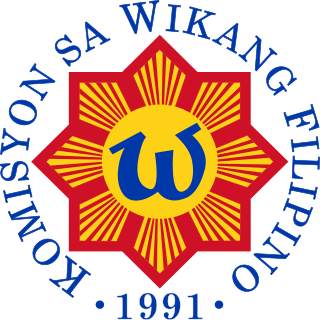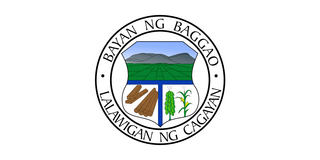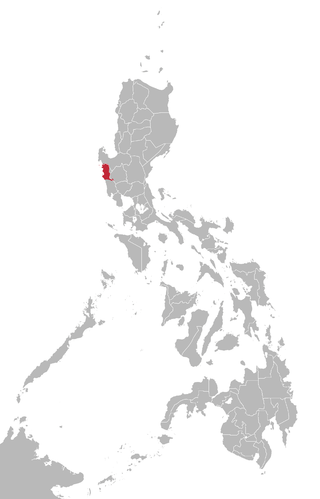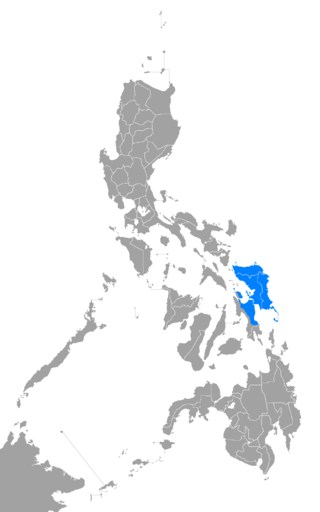Related Research Articles

Pilar Garrido Corrales is a Filipino pop singer, songwriter, actress, comedian and television presenter. She is best-known for her distinctive backbend when singing and is popularly referred to as the "Asia's Queen of Songs" for her vocal style and longevity.

Levi Celerio was a Filipino composer and lyricist who is credited with writing over 4,000 songs. Celerio was recognized as a National Artist of the Philippines for Music and Literature in 1997.

The Commission on the Filipino Language (CFL), also referred to as the Komisyon sa Wikang Filipino (KWF), is the official regulating body of the Filipino language and the official government institution tasked with developing, preserving, and promoting the various local Philippine languages. The commission was established in accordance with the 1987 Constitution of the Philippines.

Baggao, officially the Municipality of Baggao, is a municipality in the province of Cagayan, Philippines. According to the 2020 census, it has a population of 87,753 people.
Richelle Ann Mallari Loyola-Avanzado, better known by her stage name Jessa Zaragoza, is a Filipino commercial model, singer and actress. She is known as the "Phenomenal Diva" and "Jukebox Queen of the 90s" for her first studio album Just Can't Help Feelin in 1997 with the hit carrier single "Bakit Pa?" which became a hit ballad in the Philippines during 1997–1999.
Manila sound is a music genre in the Philippines that began in the mid-1970s in Metro Manila. The genre flourished and peaked in the mid to late-1970s during the Philippine martial law era and has influenced most of the modern genres in the country by being the forerunner to OPM.

Clarita "Claire" Crisostomo dela Fuente-de Guzman was a Filipina singer. She achieved celebrity status in the late 1970s with the jukebox hit "Sayang" and was given the title "Asia's Sweetest Voice" because of her singing style. She was dubbed "the Karen Carpenter of the Philippines" because of her contralto's resemblance to that of Carpenter's. Her first album in 1978 was then the Philippines' biggest seller at the time of release. She went on to record seven more albums. Besides "Sayang", she was also known for hits like "Minsan-Minsan" and "Nakaw na Pag-ibig".

Celestine Cruz Gonzaga-Soriano, professionally known as Toni Gonzaga, is a Filipino media personality, host, actress, businesswoman, singer and vlogger. She has been dubbed as the country's "Ultimate Multimedia Superstar" by various media outlets. Gonzaga was the former lead host of ABS-CBN's long-running reality show Pinoy Big Brother. Her own YouTube channel Toni Gonzaga Studio (TGS) has over 7.5 million subscribers.

Sambal is a Sambalic language spoken primarily in the Zambal municipalities of Santa Cruz, Candelaria, Masinloc, Palauig, and Iba, in the Pangasinense municipality of Infanta, and areas of Pampanga in the boundary with Zambales in the Philippines; speakers can also be found in Panitian, Quezon, Palawan and Barangay Mandaragat or Buncag of Puerto Princesa. The speakers of the language are decreasing due to the fact that many of the speakers are shifting to Tagalog and Ilocano.

The Tagalog Wikipedia is the Tagalog language edition of Wikipedia, which was launched on 1 December 2003. It has 48,158 articles and is the 105th largest Wikipedia according to the number of articles as of 19 January 2025.

The Waray Wikipedia is the Waray language edition of Wikipedia. It is hosted on servers run by the Wikimedia Foundation since September 25, 2005. As of December 29, 2024, this edition has 1,266,601 articles and is the 16th largest Wikipedia edition. The Waray Wikipedia has very few active users (74), and instead owes its large size to automatically generated articles created by bots, most of them by Sverker Johansson's Lsjbot.
William Pineda Martinez is a Filipino actor who belongs to the first batch of Regal babies whose movie career was launched in the early 1980s. He initially starred in drama films, Manila by Night (1980), Bilibid Boys (1981), Tambay sa Disco (1980) until his studio paired him with Maricel Soriano in Oh My Mama (1981) and the result was a box-office success. Their tandem spawned many hits for Regal Films, mostly comedy movies that defined and cemented their Taray and Kulit loveteam. In 1984, William was given a title role in the 10th Metro Manila Film Festival with the thriller, Alapaap as a drug-crazed writer. He got best actor nominations from award-giving bodies the following year. He is also known for his role as Ton-Ton in Bagets & Bagets 2.

The Bible has been translated into multiple Philippine languages, including Filipino language, based on the Tagalog, the national language of the Philippines.

Himig Handog is a multimedia songwriting and music video competition in the Philippines based in Quezon City. The competition is operated by ABS-CBN Corporation and its music subsidiary Star Music. The contest ran from 2000 to 2003 and was later revived in 2013. The theme of the contest has been love songs since 2002.

Susan Fuentes was a Filipino singer known as the "Queen of Visayan Songs". She recorded and popularized Visayan classics such as Matud Nila, Gimingaw Ako, Usahay, Rosas Pandan and Miss Kita Kung Christmas.
Kundiman is a genre of traditional Filipino love songs. The lyrics of the kundiman are written in Tagalog. The melody is characterized by a smooth, flowing and gentle rhythm with dramatic intervals. Kundiman was the traditional means of serenade in the Philippines.

Waray is an Austronesian language and the fifth-most-spoken native regional language of the Philippines, native to Eastern Visayas. It is the native language of the Waray people and second language of the Abaknon people of Capul, Northern Samar, and some Cebuano-speaking peoples of western and southern parts of Leyte island. It is the third most spoken language among the Bisayan languages, only behind Cebuano and Hiligaynon.
Zephanie Odhene Liwag Dimaranan, also mononymously known as Zephanie, is a Filipino singer, actress and host. She is known as the winner of the first season of Idol Philippines. Dimaranan is dubbed as "This Generation's Pop Princess" in the country by various media outlets.

Buwan ng Wikang Pambansa, simply known as Buwan ng Wika and formerly and still referred to as Linggo ng Wika, is a month-long annual observance in the Philippines held every August to promote the national language, Filipino. The Commission on the Filipino Language is the lead agency in charge of organizing events in relation to the observances.

Vicente Ignacio Luangco de Veyra, who also used the pseudonyms Vatchoo and Honey Boy, was a Waray poet, writer, anthologist, orthographer and dentist.
References
- ↑ "LUBI-LUBI, A Waray Folk Song". Tahanan Books Corporation - US. Archived from the original on April 15, 2024. Retrieved January 20, 2025.
- 1 2 3 Rey, Maestro Valle (April 10, 2020). "LUBI-LUBI – Filipino Song To Memorize The Months Of The Year + Lyrics". Philippine News. Retrieved February 12, 2021.
- ↑ Lubi Lubi Filipina Heritage Collection
- ↑ Richardson, Clem (July 20, 2012). "For two Filipino nurses in Brooklyn, their traditional music is a family affair". New York Daily News. Retrieved February 12, 2021.
- 1 2 "CCP CONTINUES TO PROMOTE PHILIPPINE INDIGENOUS LULLABIES WITH HIMIG HIMBING: MGA HELENG ATIN". CCP. October 17, 2023. Retrieved January 12, 2024.
- ↑ "CCP continues to promote Philippine Indigenous lullabies with 'Himig Himbing: Mga Heleng Atin'". Manila Bulletin. Retrieved January 13, 2024.
- ↑ Manipon, Roel Hoang (December 26, 2023). "More native lullabies get modern treatments, introduced to new audiences". Daily Tribune Lifestyle. Retrieved January 13, 2024.